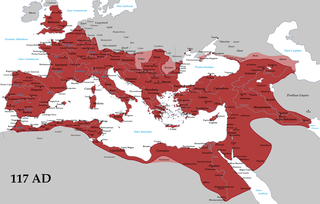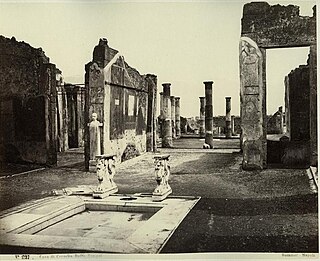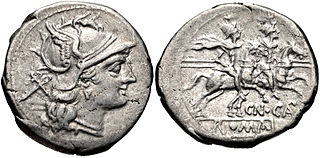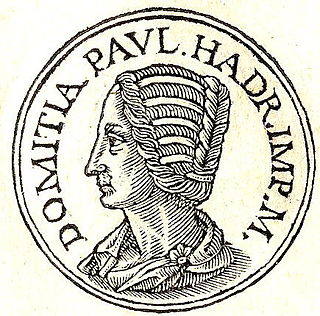Gnaeus Pedanius Fuscus Salinator was a Roman senator who was active under the Principate. He was suffect consul in the nundinium of July-August 61 as the colleague of Lucius Velleius Paterculus. [1] He is known entirely from inscriptions.

The Roman Empire was the post-Roman Republic period of the ancient Roman civilization. Ruled by emperors, it had large territorial holdings around the Mediterranean Sea in Europe, North Africa, and West Asia. From the constitutional reforms of Augustus to the military anarchy of the third century, the Empire was a principate ruled from the city of Rome. The Roman Empire was then divided between a Western Roman Empire, based in Milan and later Ravenna, and an Eastern Roman Empire, based in Nicomedia and later Constantinople, and it was ruled by multiple emperors.

The Principate or early Roman Empire is the name sometimes given to the first period of the Roman Empire from the beginning of the reign of Augustus in 27 BC to the end of the Crisis of the Third Century in 284 AD, after which it evolved into the so-called Dominate.

A consul held the highest elected political office of the Roman Republic, and ancient Romans considered the consulship the highest level of the cursus honorum.
The Pedanii were an affluent family, whose origins lie in the colony of Barcino (modern Barcelona) in Hispania Tarraconensis. Salinator may be the son of Lucius Pedanius Secundus, consul in 43, and is thought to be the father of Gnaeus Pedanius Fuscus Salinator, consul in 83 or 84. [2]
The gens Pedania was a minor plebeian family at Rome. Members of this gens are first mentioned at the time of the Second Punic War, but they achieved little prominence until imperial times, when the ill-starred Lucius Pedanius Secundus attained the consulship under Nero.

Barcelona is a city in Spain. It is the capital and largest city of the autonomous community of Catalonia, as well as the second most populous municipality of Spain. With a population of 1.6 million within city limits, its urban area extends to numerous neighbouring municipalities within the Province of Barcelona and is home to around 4.8 million people, making it the sixth most populous urban area in the European Union after Paris, London, Madrid, the Ruhr area and Milan. It is one of the largest metropolises on the Mediterranean Sea, located on the coast between the mouths of the rivers Llobregat and Besòs, and bounded to the west by the Serra de Collserola mountain range, the tallest peak of which is 512 metres high.

Hispania Tarraconensis was one of three Roman provinces in Hispania. It encompassed much of the Mediterranean coast of modern Spain along with the central plateau. Southern Spain, the region now called Andalusia, was the province of Hispania Baetica. On the Atlantic west lay the province of Lusitania, partially coincident with modern-day Portugal.



